Abstract
This paper examines recent claims that capital export neutrality no longer serves as an effective principle for the taxation of income from foreign direct investment, due to the large and growing role played by portfolio capital in financing investment and to the recognition that R&D is an important determinant of international trade and investment. In our evaluation of these claims, we find capital export neutrality appears robust. Because both domestic and foreign activities may be financed with portfolio capital, and they both produce goods that compete in the world economy, there is no compelling reason to grant a lower tax to foreign income alone. Regarding the promotion of R&D or the entry of new competitors, cutting the tax on foreign income may be no more effective than cutting the tax on domestic income. A second focus of the paper is to calculate what the residual U.S. tax rate on active foreign income actually is. Based on 1990 data this rate is negative if foreign income is defined appropriately.
Similar content being viewed by others
References
Bailey, M.N., and R.Z. Lawrence. (1992). “Appropriate Allocation Rules for the 861-8 Regulation” Council on Research and Technology.
Corlett, W.J., and D.C. Hague. (1953–1954). “Complementarity and the Excess Burden of Taxation”Review of Economic Studies 21, 21–30.
Dixit, A., and J.E. Stiglitz. (1977). “Monopolistic Competition and Optimum Product Diversity”American Economic Review 67, 297–308.
French, K.R., and J.M. Poterba. (1991). “Investor Diversification and International Equity Markets” National Bureau of Economic Research Working Paper No. 3609.
Frisch, D.J. (1990). “The Economics of International Tax Policy: Some Old and New Approaches”Tax Notes (April 30), 581–591.
Horst, T. (1980). “A Note on the Optimal Taxation of International Investment Income”Quarterly Journal of Economics 94, 793–798.
Hufbauer, G.C. (1992).U.S. Taxation of International Income, Blueprint for Reform. Washington, DC: Institute for International Economics.
Joint Committee on Taxation, House Ways and Means Committee. (1991). “Factors Affecting the Competitiveness of the United States” (May 30), pp. 232–248.
Lyon, A., And G. Silverstein. (1994). “The Alternative Minimum Tax and the Behavior of Multinational Corporations” Paper presented to the NBER International Tax Conference, January.
U.S. Department of Commerce, Bureau of Economic Analysis. (1992).U.S. Direct Investment Abroad: 1989 Benchmark Survey, Final Results. Washington, DC: U.S. Government Printing Office.
Author information
Authors and Affiliations
Rights and permissions
About this article
Cite this article
Grubert, H., Mutti, J. Taxing multinationals in a world with portfolio flows and R&D: Is capital export neutrality obsolete?. Int Tax Public Finan 2, 439–457 (1995). https://doi.org/10.1007/BF00872776
Issue Date:
DOI: https://doi.org/10.1007/BF00872776




